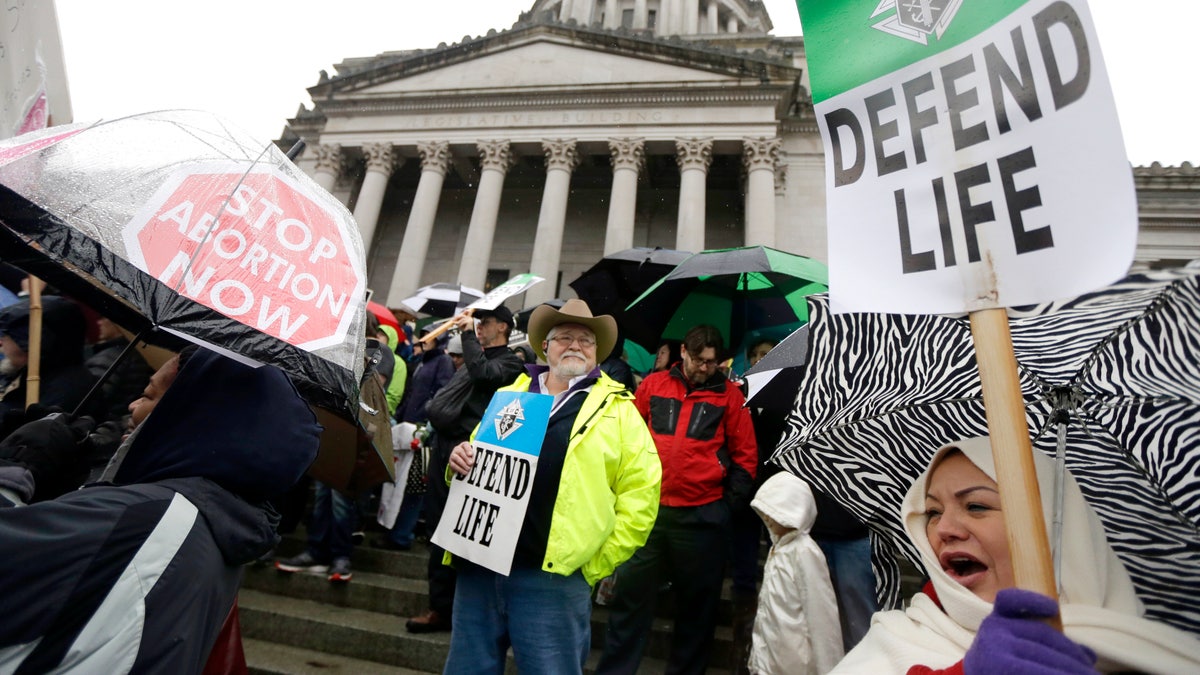
Anti-abortion demonstrators take part in a rally, Tuesday, Jan. 19, 2016, at the Capitol in Olympia, Wash. (AP Photo/Ted S. Warren)
Friday, September 30 marks the 40th anniversary of the Hyde Amendment—the appropriations legislation first introduced in 1976 by Rep. Henry Hyde for fiscal year 1977 that bars states from using federal funds to pay for abortion.
The language of the Hyde Amendment, reintroduced for each budget, has changed somewhat over the years, eventually including exceptions in cases of rape, incest, and threats to a mother’s life, but it consistently has stood for the principle that taxpayers should not be forced to pay for abortion on demand.
This is a straightforward principle, and polling consistently shows over 60 percent of Americans oppose taxpayer funding for abortion.
A Marist poll released this year found 68 percent of respondents oppose public funding for abortion, including 51 percent of those who consider themselves pro-choice.
This is understandable. It is inconsistent with the notion of choice for people to be forced to pay for a practice they rightfully consider a grave wrong. Indeed, the Hyde Amendment enjoyed bipartisan support for decades.
One might therefore think the amendment would be safe for the foreseeable future. That would be wrong, for two reasons.
First, the bipartisan support shown by the political branches of government—the president and Congress—is apparently breaking down. ObamaCare, which passed without a single Republican vote, specifically permits public funding for plans that include abortion as long as the plans employ thinly veiled accounting gimmicks.
Even more alarming, this year’s Democratic National Convention adopted for the first time a platform specifically calling for the repeal of the Hyde Amendment, a position Hillary Clinton took in January when she addressed the Planned Parenthood Federation of America.
If only my side of the aisle continues to support the amendment, its survival as a legislative matter is uncertain.
Second, even if members of Congress hold firm in their support, it is possible that the popular will could be overridden by an activist Supreme Court.
Recent commentary has generally ignored this possibility, but it is real. In 1977, the Court held in Maher v. Roe that Roe v. Wade “implies no limitation on the authority of a State to make a value judgment favoring childbirth over abortion, and to implement that judgment by the allocation of public funds.”
The most basic respect for the democratic process should have made it obvious that representative government could respect the people’s preference for life in how it allocates their tax dollars. The vote in that case, however, was 6 to 3, and when a direct challenge to the constitutionality of the Hyde Amendment came in Harris v. McRae in 1980, the Court upheld the legislation on similar grounds by the narrowest margin of 5 to 4. The change of a single vote would have eviscerated the Hyde Amendment before its fourth anniversary.
Its fate may be even more precarious today. The vacancy created by the death of Justice Scalia creates the prospect for the most liberal Supreme Court in over 40 years. While none of the justices on either side of the Harris v. McRae decision are still on the Court, today’s Court has shown a penchant for activism in ways that were unthinkable even during the 1970s.
Consider that in 1972, a Supreme Court that included three of the four future Harris dissenters summarily rejected without a written opinion the claim of a same-sex couple that the Constitution conferred on them a right to marry. That Court did not consider the question even a close one, yet today’s court has no compunction about redefining marriage for all 50 states.
An unprecedentedly activist liberal Court, which could attain a supermajority given the expected retirement of additional justices over the next few years, would have an unbounded sense of what it could do by judicial fiat.
We should entertain no illusions about what is at stake in the election of congressmen who vote on bills and presidents who appoint judges.
We should stand committed as a country to the respect for life inherent in having our government refrain from subsidizing abortion. This includes taking extra care that we do not allow our elected leaders to staff the courts with judges who would undermine our ability to express this basic respect for life through a democratic process we can no longer take for granted.
